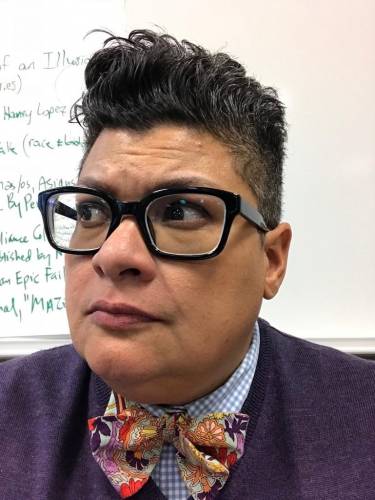Making peace by disrupting systematic racism
Honoring God’s temples
Rev. Jessica Vazquez Torres
1 Corinthians 3:16 (CEB)
Don’t you know that you are God’s temple and God’s Spirit lives in you? If someone destroys God’s temple,
God will destroy that person,because God’s temple is holy, which is what you are.
Reflection: It is abhorrent that we live in a nation where people still have to assert that “Black Lives Matter,” “Indigenous People are not Mascots,” “Human Beings are not Illegal,” “Trans Lives Matter,” and “Women Have Agency Over their Bodies.” Our systemic and willful resistance to recognize these truths results in policies that dehumanize people of color — and other vulnerable populations — in ways that impact life expectancy, health outcomes, and safety.
Even more abhorrent is the fact that so many Christians still struggle to name these truths. Churches worry, “What would people say if …” we affirmed the inherent worth, dignity and holiness of people of color, women, and people who are Queer, Trans, and undocumented. Despite the warnings of the Belhar Confession, churches are quick to declare allegiance to powers and principalities other than God. In this case, our churches pledge allegiance to ‘what people think’ and ‘cultural values’ — a thinly-veiled moniker for racism, misogyny, and homo-and-transphobia.
Like the powerful and influential church of Corinth, we become invested in the twisted values and prejudices promoted by the culture around us. Rather than carrying God’s liberating mission into the world, we deepen the chasms that threaten that very mission. While we fight over internal concerns, those made siblings to us by God are perishing! Sometimes this is a result of our actions, practices, and policies; other times, it’s a result of our silences, passivity, and apathy. What will it take for us to learn from Corinth? What will it take for us to remember that when Paul writes “You are God’s temple,” that “you” includes every being in God’s creation?
Action: Courageously push your faith community to work for the integrity of God’s whole body by loudly and unapologetically proclaiming the truths listed above. Show up for one another. Empowered by the Holy Spirit, witness to the reality that we belong to Christ and each other.
Prayer: God, forgive us for the ways we feed the divisions that threaten your body. Remind us that we belong to Christ and each other, regardless of what tricksters among us declare. Amen.

Rev. Vazquez Torres works in antiracism, anti-oppression, and cultural competency. A 1.5-Generation ESL Queer Latina of Puerto Rican descent, she holds a BA in Criminal Justice, an MDiv from Christian Theological Seminary, and an MTS from the Candler School of Theology at Emory University. When not on a plane, Jessica attempts to become a bread baker, cultivates community with her spouse, Laura, and sings songs badly with full abandon.
This year’s A Season of Peace Resources are designed to help Presbyterians explore different forms and lenses for peacemaking. From the personal level to global issues, these reflections and prayers will help grow the faith and witness of the whole church. Through the 29 days of this year’s Season of Peace, we are invited to reflect upon:

- What does it mean to commit to Peace?
- Making peace by addressing root causes of poverty
- Making peace by disrupting systematic racism
- Making peace by ending violence
- Making peace by supporting refugees and migrants
- Partaking in peace in worship and at table this World Communion Sunday and through the Peace & Global Witness Offering
Each author represents a variety of vocations and experiences in peacemaking efforts. Individuals and households are invited to make use of these daily reflections beginning on Sunday, September 1, and concluding on World Communion Sunday, October 6.